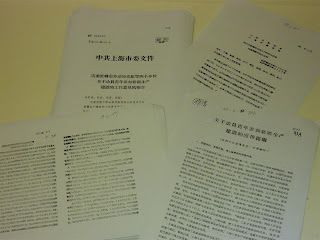Though disappointed I have to leave China so soon, I am delighted with how this trip has turned out. In the remainder of the post I offer some initial thoughts on my research--what I learned and what remains to be done.
When I applied for funding from the Sigur Center my idea was to conduct research on China's relations with the Soviet Union inside of the Xinjiang Uyghur Autonomous Region. Located in the far northwest and situated along the Sino-Soviet border, Xinjiang was both an area for cooperation in the 1950s and then a sticking point in the 1960s between Beijing and Moscow. During a previous research trip to Beijing I discovered hundreds of documents on Sino-Soviet relations in Xinjiang at the Foreign Ministry Archive, and so my research plan for this summer was to really dig into those materials.
But as fate would have it, the Foreign Ministry Archive is no longer as accessible as it once was. So instead of Beijing, I came here to Shanghai to get a lay of the land in terms of the local archives. I couldn't be happier with what I discovered here. I found hundreds of documents--many more than I could possibly process in just a few short weeks--on the connections between Shanghai and Xinjiang in general and on the dispatch of perhaps 100,000 Chinese youth from Shanghai to the far northwest in the 1960s in particular.
 |
| Shanghai youth in Xinjiang. Image via SHZQ.org |
This is a subject which I admittedly knew little about prior to my forays into the archives here, but I have become absolutely fascinated by this topic. I am eager to continue studying the relocation of the Shanghai youth to Xinjiang both as a political movement and as a human experience, but in the mean time here are some preliminary thoughts:
Most of the documents I've obtained were produced by and for political leaders and deal with the mobilization of Shanghai's educated youth to take part in Xinjiang's economic development in the 1960s. The impetus for the mass mobilization seems to be two-fold, both pragmatic and yet strongly ideological.
Many of the documents, for example, refer to the growing urban population and the increasing shortage of jobs for middle school and high school graduates. Xinjiang, it is often noted, however, has precisely the opposite problem: not enough people for a land of great economic promise and opportunity. So Shanghai's leaders believed there was a convergence of interests and needs between the two regions and thus began the campaign to send youth to the northwest.
 |
| A handful of documents from the Huangpu District Archives |
In future research I will need to continue to tease out both the origins of the movement to send Shanghai's educated youth to Xinjiang as well the evolution of the movement as it unfolded from 1963 onward. Significantly, however, I also need to understand the human component of this story. These were real people sent to Xinjiang--some of them enthusiastically went to the northwest (I found one document describing how a teenager wrote a letter demanding he be allowed to go to Xinjiang using not a pen, but his own blood), while many of them were forced to move faraway from families and friends to a strange and hostile environment. Though additional documents from Shanghai's archives will help reveal the personal stories of this experience, oral history could be a better method to capture and understand this history. Many of the youth petitioned the government for permission to return to Shanghai in the 1980s, and those that are still alive today should be in their 60s and 70s. It can only be hoped that some of them will be willing to open up to an interested stranger.
Charles Kraus, Ph.D. Student, Department of History
Sigur Center 2013 Research Fellow
Shanghai, China






Follow Us
Were this world an endless plain, and by sailing eastward we could for ever reach new distances